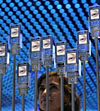New French research on collective mobile phone use
The research, which involved six months of field observations and interviews, was commissioned by the French Association of Mobile Operators and managed by researchers of Gripic, a research group of the information sciences school Celsa at the University of Paris-IV-Sorbonne.
Here are some of the insights, as reported in Le Monde (and translated by the author of this blog):
“The mobile phone is more and more used in a collective way,” says Joëlle Menrath, one of the researchers. “Real collective strategies are developing, with teens often passing their phone on to their friends to take maximum advantage of the prepaid calling plans and the discounts these offer.” Those who have not fully used their own discount options, let others profit from it. In fact, these users often juggle with the tariff options of their close friends. They might take advantage of the free calling hours of one of their friends, or will choose a plan based on the plans that other friends have chosen. Sometimes, a group of friends might subscribe to different mobile operators so that they can extend their geographic coverage.
These strategies can also be found within families. Children “beep” their parents to save on communication costs: it works as a code, with one or two rings before hanging up, and lets people know that you want them to call you back. “This way parents are reassured, they maintain their hierarchical position, but they also have to pay for the communication,” notes Mrs. Menrath. Children have in a way largely subverted the initial attempt at constraint to their own advantage…
The shared use of the mobile also leads to the disappearance of its function as a private object containing intimate secrets. “It servers more and more as a tool to express oneself,” says Anne Jarrigeon, another of the researchers involved. When a teen is momentarily absent, friends often take the phone to read out recently sent text messages or to view recent photos.
Such a transparency can of course backfire. “Within couples, spying on the mobile of one’s partner is very common,” says Mrs. Menrath. The call history and text and photos in the phone’s memory can have devastating effects. “The mobile phone plays a key role in many break-ups,” admits Mrs. Menrath.
Whatever may be the case, the device has become indispensable and people use its many new functions is ways that were not anticipated. “The music or the photo functions do not transform the device into a digital Swiss Army knife,” says Mrs. Jarrigeon. “It remains a telephone that allows for some other secondary uses”. The research shows that the mobile phone is no substitute for an MP3 player or a digital camera. But it lets people create a photographic notebook of daily life that one can show to close relations to illustrate a story being told, or to let people listen to one’s exploits.
These new ways of using the mobile orginate more often from the imagination of the subscribers, than they do derive from the manufacturers. “In Japan, the users of the metro system always keep their travel card and mobile phone together,” reminds Mrs Menrath. “It is by observing them that NTT Docomo decided to integrate this function into their phones.”
The new research, which is not yet available online, builds on a previous research project on the social use of the mobile phone, published in 2005.





[…] French newspaper Le Monde reported yesterday on couples’ mobile phone spying behaviour, now the International Herald Tribune has […]
[…] people first highlights a new piece of research, which makes me wish I read French. The French newspaper Le Monde reports on new research, […]